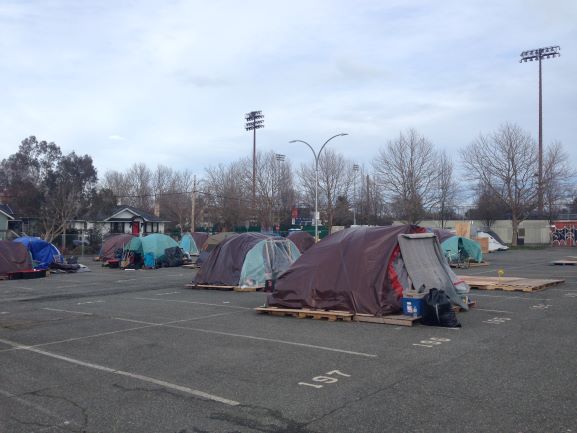The by-and-for-sex-workers organization adapted to support campers at Royal Athletic Park

For residents of the Royal Athletic Park encampment, the last couple of months have been anything but predictable. They have faced stresses ranging from unprecedented snowfall to evolving information around transitional housing. Through it all, one organization has played a unique role in helping meet the community’s shifting needs.
Founded in 1995, the PEERS Victoria Resource Society has always been a by-and-for-sex-workers organization. Although supporting sex workers has meant a broad and inclusive focus on health, harm reduction, connection, housing, and additional services, they did not always have the resources to support the general unhoused population of Victoria as expansively as they do now. When COVID-19 hit in March 2020, however, PEERS saw gaps in community support, and wanted to be part of the solution.
“The unhoused population really got left out [by] COVID-19 planning and emergency response planning,” PEERS Executive Director Rachel Phillips explains. “There was a lot of talk and there were a lot of people invested in seeing something happen. But in the moment, people weren’t getting the services that they needed or having their basic needs met.”
Phillips also states that she is grateful to the organization I-Heart (Indigenous Harm Reduction Team) for inviting PEERS to join conversations around supporting the unhoused population when the pandemic began.
Folks at PEERS noticed that encampments were popping up throughout Victoria, at places like Topaz Park, Cecilia Ravine, and Beacon Hill Park (Meegan). They began to show up once or twice a week at spots all around the city with snacks, water, hygiene and harm reduction supplies, and the desire to connect.
Stephanie Lala John, a resident at Royal Athletic Park who first got to know PEERS at Central Park in the summer, says that they have become like family to her. She is also grateful for the coordination of donations that PEERS has undertaken. “The tent that’s over us right now, the blankets, the pillows, the clothes, the jackets, the shoes… everything I own right now is from PEERS. And I’m surprised that it matches!”
PEERS Health Outreach Coordinator Katy Booth explains, “once a tent popped up we put it on our list and then we would start going there regularly.” As the second largest site for outdoor sheltering in the city, Central Park was no exception.
As PEERS bonded with folks at Central Park, they wondered how they could make their presence more consistent. They realized the RV they typically used for night outreach could function as a daily point of contact at the park, and allow them to distribute more supplies than they could otherwise, like clothing and tents.
Then a crisis struck. On December 21, extreme weather flooded dozens of people living in Central Park out of their homes. The aftermath saw over thirty people relocated to a parking lot beside Royal Athletic Park as an emergency measure sanctioned by the City of Victoria.
At that point, PEERS’s new routine was just beginning, Booth says. “We were like, thank goodness we’re using the RV, we can just move it over a block and then be able to do the same thing that we were.”
As temperatures dropped, an idea which had emerged during conversations in the summer was revitalized, allowing PEERS to take their newly stable presence a step further. When the North Park Neighbourhood Association approached them asking if they would consider setting up a warming tent on site, PEERS applied for public funding and started thinking about logistics. By January 20, the new space was up and running.
Booth thinks the warming tent has made a huge difference as a space for connection. “We knew folks before, but not to the same level. To really be able to engage and to build relationships, and advocate and understand: what are some of the things that people are facing and how can we help?”
Resident Darren Murphy agrees. “The warming tent—I find that it’s brought people out more, they come out more. (…) Among the people living here there’s more communication, and teamwork, and all in all I’d say that’s a plus. The warming tent has been a welcome addition.”
PEERS also supports residents in accessing treatment services and connecting them with organizations such as BC Housing.
As an organization that privileges experiential voices as part of their mandate, PEERS habitually initiates conversations with the communities that they help about what they need and what could be improved. With this openness has come the need to remain nimble.
This is why, when asked about the future, Booth says she doesn’t have an answer. After all, though they might have ideas, uncertainty is the name of the game. When asked what PEERS plans on doing to support the unhoused as spring unfolds, Booth says, “We don’t know, but everything that we possibly can.”






